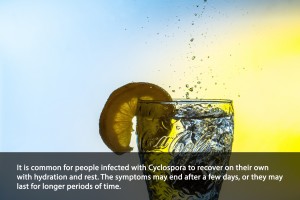“Cyclospora” is a single celled organism that causes intestinal illness in humans. All cases of the illness are caused by a single strain, Cyclospora cayetanensis. Symptoms of Cyclospora infection can appear as soon as 2 days or as long as 11 days after ingesting the parasite, although generally the symptoms will appear after one week. Because Cyclospora infects the small intestine, it causes symptoms such as watery diarrhea, loss of appetite, stomach cramps, weight loss, nausea, fatigue, and vomiting.
Recovery and Long Term Effects of Cyclospora

It is common for people infected with Cyclospora to recover on their own with hydration and rest. The symptoms may end after a few days, or they may last for longer periods of time. Cyclospora infections have a tendency to cause relapse, which means that the diarrhea can go away and come back several times for up to a few months
Treatments do exist for Cyclospora infections, usually in the form of a combination of antibiotics. Medications such as Bactrim and Septra contain a chemical called trimethoprim-sulfamethoxazole, often called sulfa, which can treat the infection. For those that are allergic to sulfa drugs, there is no treatment currently available. There is also no vaccine that prevents the infection.
How Cyclospora is Contracted

The cause of Cyclospora infections is usually ingesting food or water that has been contaminated with feces. Cyclospora is not immediately infectious, as it needs days or weeks to grow before it can infect humans. As a result, person to person transmission is rare. In many cases, fresh produce is the means through which the infection occurs. Outbreaks have been tied to many different types of produce, including basil, raspberries, snow peas, and cilantro. Cyclospora is more common in tropical and subtropical regions. It also tends to have a more seasonal infection pattern, although the factors for this pattern have not yet been identified.
Persons Most Commonly Affected by Cyclospora Poisoning
Anyone can be infected with Cyclospora, but there are certain factors that put some people at more risk than others. Any immunocompromised person will be more susceptible to infection, as will children and the elderly. Those with HIV/AIDS may be at risk for a lingering Cyclospora infection that may last for months. People that travel to tropical or subtropical climates where the disease is more prevalent are also at an increased risk. The CDC recommends that travelers be careful about what they eat and drink so that they may avoid infection.
Medical Detection
The diagnosis of a Cyclospora infection is subject to a stool test. Your doctor may require multiple samples from multiple days in order to find the parasite. Because there are many different causes of the symptoms associated with Cyclospora infections, the test may be done while testing for other pathogens.
If you or a loved one has been diagnosed with Cyclospora poisoning and suspect that it may be related to a recent food recall, we invite you to contact us for a free consultation.


